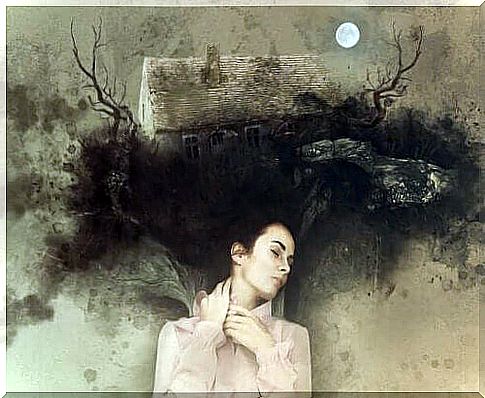Our Bad Dreams Prepare Us To Face Our Fears

Some of the dreams we have at night prepare us to face our fears. This imaginary universe towards which our brain takes us every night sometimes fulfills a role that one could almost qualify as therapeutic. According to recent studies, many of our anxieties and fears appear in the dream subconscious in order to help us manage their impacts on our conscious life.
The data is striking to say the least. For example, to think that the very purpose of a bad dream or nightmare is precisely to contribute to our balance, adaptation and well-being is something as interesting as it is surprising. First of all because the dream world is still quite enigmatic. Although today, we understand it a little better.
It hasn’t always been that way. During the 18th century, bad dreams were considered to be illnesses of the mind. A state in which human suffering was manifested. This idea has of course evolved. Today, subject matter experts like Cambridge Health Alliance clinical psychologist Dr Deirdre Barrett define bad dreams as emotional manifestations that are critical to our development.
We also know that children aged 3 to 6 tend to have more bad dreams. Indeed, from their point of view, their environment is filled with things that they do not understand. They interpret many elements as threats that end up appearing in their dreams in terrifying ways. As they grow and mature, and these scary worlds are less and less present in their dreams.
Let’s dig deeper.

We all have dreams that aim to help us face our fears
Cognitive behavioral therapy offers a very specific strategy to get patients to reduce the intensity of their emotional response to certain fears and phobias that are sources of stress. This is exposure therapy. The patient is then directly exposed to the situation which arouses fear in him. However, this is still done in a very controlled manner.
We are obviously all “programmed” in the same way. This dream mechanism therefore exists in each of us. Who has never lived a dream that confronts them with their deepest fears? These dreams actually allow us to face some of our fears.
The origin of fear can be many and varied. It could be a job interview, an exam, getting on a plane, fear of being abandoned or being betrayed by a partner, etc. All these situations are, for many, the source of real anxiety. The brain knows it. He is aware of it and that is why he transfers it to the structure of dreams with the intention of overcoming these fears.
The objective of the brain is therefore to expose us to these fears in order to make the problem visible. He’s trying to get us to solve it. However, it often does so by means of symbolic representations that are complex and not always easy to decode.
Bad dreams (not nightmares) would be our therapeutic allies
It’s a little hard to believe though. To think that our bad dreams would have a use, that of helping us to face our fears. It is even certainly difficult to accept for several reasons. First, because bad dreams generate a feeling of discomfort. So it is not easy to believe that a negative feeling can help us in any way.
Second, there would be another counter argument. Many of us don’t remember our dreams. So… how would having a bad dream that we don’t even remember be useful to us? Last year an interesting study came out. This is a study conducted jointly at the University of Geneva, the University Hospitals of Geneva (HUG) and the University of Wisconsin (USA).
This investigation revealed that certain ailments strongly activate our cerebral tonsil. This structure is responsible for producing the sensations associated with fear. During this work, study participants were asked to write down their dreams every night and try to figure them out. To give them meaning.
It turned out that many of these bad dreams were related to real problems. Situations of stress or anxiety. Just decoding the message these dreams conveyed even helped them reduce their emotional load. But also to develop adaptation strategies.
However, the study authors point out that nightmares do not serve the same purpose. Indeed, in a bad dream the fear is moderate, while in a nightmare its intensity is excessive. So this impacts us in a very negative way.

The dream world, a space to see each other face to face and to get to know each other
One of the authors of this research, Dr. Lampros Perogamvros, reports that understanding dreams also helps us cure anxiety disorders. It would not then be a form of exclusive therapy. But rather an additional tool to tackle the heart of the problem. It would also help to better manage the emotional impact of anxiety disorders.
In a way, this idea is similar to a thought of Carl Jung. The world of the unconscious and the fabric of dreams only seek to restore psychological balance. It is one more channel to understand and use to our advantage. It would therefore ultimately be a matter of recording our bad dreams, understanding them, accepting them and generating changes in our conscious life to face our fears.
A complicated, but interesting task that is undoubtedly worth getting involved.










